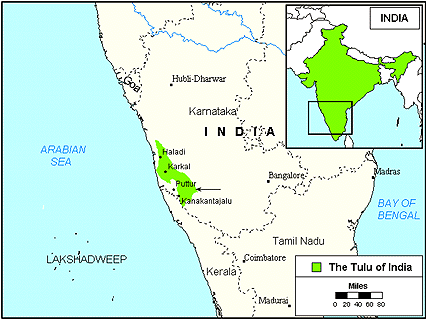|
|
Prayer Profile
The Tulu of India
![[IMAGE]](../images3/0489.jpg) India is a complex, colorful mosaic of religions, languages, and cultures, with over 300 different languages spoken by thousands of ethnic and social groups. Geographically, the nation is no less diverse, with features ranging from the jagged, snow-capped peaks of the Himalayas to the flat, fertile plains of central India.
India is a complex, colorful mosaic of religions, languages, and cultures, with over 300 different languages spoken by thousands of ethnic and social groups. Geographically, the nation is no less diverse, with features ranging from the jagged, snow-capped peaks of the Himalayas to the flat, fertile plains of central India.
The 2.1 million Tulu live in southern India in the state of Karnataka. They inhabit a large number of villages and towns in the southern portion of the state. The Tulu are a fair-skinned people who are known for their friendliness and hospitality. They speak a Dravidian language, also called Tulu, which lacks a script. As a result, the script of the related Kannada language is used. Kannada is a common second language, and some Tulu speak English as well. In the regions bordering the state of Kerala, the Tulu can also understand the neighboring Malayalam language.
What Are Their Lives Like
Many of the Tulu are farmers who own large portions of land. Major crops cultivated include rice, sugarcane, spices, plantains, betel nut, and cashews. The poorer Tulu work as laborers in others' fields. Both Tulu men and women are known as hard workers who do not idly pass the time. For the ones who live in towns, business is the main source of income. In areas close to the Arabian Sea, fishing has become an important industry. Educated women often leave the smaller towns for professional careers in the large cities.
The Tulu live in a variety of dwellings. In most cases, level of income determines the kind of house. The most common type of house has a tile roof and is typical of much of southern India. In the fields of education, art, and culture, the Tulu are highly advanced. Education is given very high priority, and nearly 90% of the people are literate. In the field of art, the Tulu have a long, artistic tradition, with murals, handicrafts, and water paintings having been made since ancient times. Music and dance play an important role in their festivals and celebrations. For recreation, they enjoy such sports as buffalo racing and cockfighting.
Like nearly all peoples in India, the Tulu are divided into social groups called castes. Castes are based primarily on profession, with nearly all members of a particular caste having the same occupation. Castes are also hereditary and are ranked in prestige according to the honor of their particular profession. Consequently, members of a more prestigious caste avoid associating with lower castes and will not generally marry members of a lower caste. Although the Indian government has tried to eradicate these social classes, the caste system is so deeply ingrained that it has proved nearly impossible to abolish.
What Are Their Belief?
The majority of the Tulu are Hindus. As such, they believe in millions of gods and goddesses. According to Hindu doctrine, souls live innumerable lives in different bodies in a continuous cycle of death and rebirth. This process of reincarnation supposedly continues until the soul achieves spiritual perfection and enters a higher level of existence.
Followers of Jainism are a common minority group among the Tulu. Jainism is similar to Hinduism but differs on a few main points. Whereas Hinduism encourages the caste system, Jainism is against it. In addition, Jains do not believe in millions of gods, as do Hindus.
What Are Their Needs?
Missions agencies have worked among the Tulu since the early eighteenth century. However, the growth of the church has been painstakingly slow, and today, only 1% of the Tulu profess to be Christian. Both the New Testament and the Jesus film are available to the Tulu, but Christian broadcasts in their native tongue are lacking. Committed missionaries who understand the Hindu mindset are desperately needed if this people group is to be substantially impacted by the Gospel. Above all, faithful intercessors are needed to see the Tulu won to Christ.
Prayer Points
- Ask the Lord of the harvest to call missionaries to India to minister Life to the Tulu.
- Pray for opportunities to show the Jesus film to the Tulu, with many conversions resulting.
- Pray that Christian radio and television broadcasts will be made available to the Tulu in their own language.
- Ask the Lord Jesus to supernaturally reveal Himself to the Tulu through dreams and visions.
- Ask the Holy Spirit to anoint the Tulu believers as they share Christ with their families and friends.
- Take authority over the spiritual principalities and powers that are keeping the Tulu bound.
- Ask God to raise up prayer teams who will begin breaking up the soil through worship and intercession.
- Ask the Lord to bring forth a triumphant Tulu church for the glory of His name!

Statistics
Latest estimates from the World Evangelization Research Center.
THE PEOPLE
- People name: Tulu
- Country: India
- Their language: Tulu
- Population:
- Largest religion:
- Christian: 1%
- Church members: 21,483
- Scriptures in their own language: New Testament
- Jesus Film in their own language: Available
- Christian broadcasts in their own language: None
- Mission agencies working among this people: 1
- Persons who have heard the Gospel: 816,300 (38%)
- Persons who have never heard the Gospel: 1,332,000 (62%)
THEIR COUNTRY
- Country: India
- Population:
- Major peoples in size order:
- Major religions:
- Number of denominations: 8
© Copyright 1997
Bethany World Prayer Center
This profile may be copied and distributed without obtaining permission
as long as it is not altered, bound, published
or used for profit purposes.
![[HOME BUTTON]](../graphics/home.jpg)
![[CALENDAR BUTTON]](../graphics/calico.jpg)
![[LIST BUTTON]](../graphics/listico.jpg)
[Home]
[Calendar]
[Country List]
|